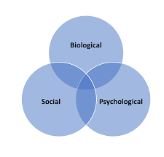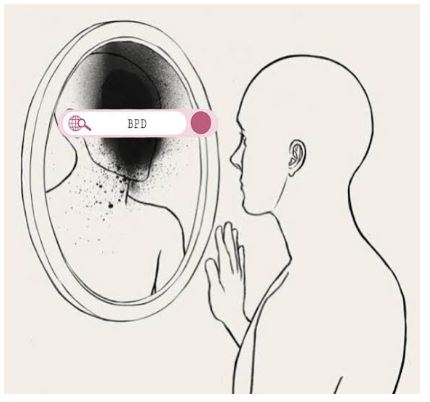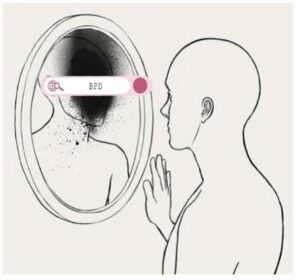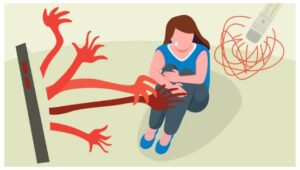When Your Brain, Body, and History All Speak at Once
Folks with Borderline Personality Disorder (BPD) aren’t just “emotional.” Nah, it’s like they’ve got the emotional volume cranked up to eleven, all the time, no mute button. It’s not just some vague sadness or dramatics either. The pain’s wired into their bodies, their hormones, even their survival instincts. It’s biological, psychological, relational, basically, it’s everywhere.
BPD doesn’t mean someone’s broken. It’s what happens when a super-sensitive person gets dropped into a world that feels like it’s constantly on fire. If you actually look at BPD through a biopsychosocial lens (yeah, I know, sounds fancy), things start making a lot more sense. We stop blaming people, start understanding them. Suddenly, “what’s wrong with you?” turns into, “what happened to you?” That shift? It changes everything, especially how healing happens.
Why BPD Is So Emotionally Intense
- Biological Sensitivity
Born Sensitive, Not Broken Some people just come out of the womb with their feelings dialed all the way up. Their brains literally process emotions faster and deeper than most. The amygdala (that’s your brain’s smoke alarm) is jumpy as hell, while the prefrontal cortex (the “chill out” part) is still hitting snooze. It’s not “too much”, it’s just their nervous system doing its best to keep them alive.
- Psychological Trauma
Trauma? Oh, It Leaves a Mark Super sensitive kid + chaotic or shaming environment = disaster. They start believing their feelings are dangerous, or worse, that they themselves are the problem. That’s a heavy load for anyone, let alone a child
- Social Invalidations
Society Loves a Label People with BPD get called dramatic, manipulative, unstable, you name it. Their pain gets weaponized against them, which just shoves the wound in deeper. Try healing when everyone’s blaming you for suffering. Yeah, it’s rough.
Busting the Myth: “They’re Just Addicted to Drama”
People with BPD are NOT addicted to drama. That’s straight-up nonsense. They’re not thrill-seekers; they’re folks whose nervous systems are stuck on red alert. Their emotions crash like tidal waves, relationships swing from “don’t leave me” to “get away from me.” What looks like “mood swings” is actually them fighting to stay connected and safe. Not attention-seeking, attachment-seeking. Big difference
The Inner Experience of Someone with BPD
Here’s the inside scoop, stuff people with BPD might actually say:
“I feel like I’m drowning in my own emotions.”
“When I’m abandoned, it feels like I’m dying.”
“I panic over things that don’t seem to affect anyone else.”
“I crave connection, but the closeness terrifies me.”
“Sometimes I go numb just to get through the day.”
That’s not drama. That’s survival mode, every single day. These folks need understanding, not judgment.
What Biopsychosocial Healing Might Look Like
Well, there’s no magic fix, sorry. It takes a mix of biology, psychology, and social support.
Biological Support
- Nervous system regulation through somatic therapy, grounding, and breathwork
- Supporting sleep, nutrition, and hormone balance
- Psychiatric care when needed, always with a trauma-informed approach
Psychological Healing
- Internal Family Systems (IFS) and EMDR to process deep-rooted emotional pain
- Dialectical Behavior Therapy (DBT) to build skills around distress, emotion regulation, and interpersonal effectiveness
- Psychodynamic therapy to strengthen a stable sense of self
Social Repair
- Attachment-focused therapy to repair relational wounds
- Group work to reduce shame and create shared healing
- Learning to say: “I exist. I’m allowed to feel. And I matter.”
Healing isn’t just an inside job; it’s also about finding your people, your safe spaces.
A Mini Real-Life Example: Aman’s Story
Here’s a quick story for you: Aman tried everything to outrun his feelings, success, substances, people, you name it. Still, the storm never let up.
Once he landed in trauma therapy, things started to shift. He realized his feelings weren’t out to get him, they were just signals, not threats.
Eventually, Aman figured out he didn’t have to fight his emotions; he could actually befriend them. He still feels a lot, but now he trusts himself a little more each day. That’s healing.
And in doing so, he’s becoming someone he can trust.
Why Coach For Mind Holds BPD with Nervous System Wisdom
And look, at Coach For Mind, we don’t just slap a “BPD” label on you and send you on your way. We see the whole messy, complicated human. We know this is trauma’s fingerprint on a sensitive system. Our therapists in India get it, they’re all about integrating biology, history, and relationships into therapy. We’re not here to “fix” you. We’re here to help you understand your story, and maybe, help you write a new one. No shame. Just steadiness. We meet you right where you’re at.
FAQ: Understanding the Emotional Intensity of BPD
Why do people with BPD feel emotions so strongly?
The nervous system of people with borderline personality disorder is frequently wired for intensity. The brain’s emotional alarm system, the amygdala, is triggered with speed and force. However, the prefrontal cortex and other brain regions that control those emotions may not keep up. This indicates that there is little ability to turn down the emotional “volume,” which is turned up high. Trauma exacerbates the situation by making small disagreements or feelings of rejection feel disastrous, particularly early or relational trauma.
Is BPD just psychological, or is it also neurological?
Both are involved. Although BPD is categorized as a personality disorder, current research in neuroscience indicates that it is associated with quantifiable alterations in brain activity. A combination of early attachment styles, trauma exposure, and genetics influence these changes. Therefore, it’s not “just in your head” in the contemptuous sense; rather, it has deep roots in both life experience and brain wiring.
What does emotional dysregulation actually feel like?
Imagine losing your life jacket while drowning in emotion. Feelings of panic, guilt, or anger taking over your body and mind can cause emotional dysregulation, which can leave you numb, confused, or impulsive. It’s about a nervous system that hasn’t learned safety or calming, not about overreacting to get attention. This is frequently misinterpreted as being “too dramatic” or “too sensitive” in the Indian context, but it’s actually a trauma response that calls for empathy.
Can people with BPD get better without medication?
Indeed, a lot of people do, particularly when receiving therapy that targets the disorder’s relational and emotional causes. Effective modalities include Internal Family Systems (IFS), somatic therapy, trauma-informed relational work, and dialectical behavior therapy (DBT). Co-occurring symptoms like anxiety or depression can be managed with medication, but developing trust, emotional control, and a sense of safety in your own body are often the keys to healing
How is trauma-informed therapy different from traditional approaches?
Symptoms like mood swings or self-harm may be seen as issues that need to be resolved in traditional approaches. The question of trauma-informed therapy is why those patterns emerged. It recognizes that a history of unfulfilled needs, abandonment, or emotional neglect typically lies behind emotional outbursts or withdrawal. Instead of control or correction, it places more emphasis on safety, validation, and teamwork.
What happens in the brain during a BPD trigger?
The brain shifts into survival mode. The amygdala fires, cortisol surges, and the prefrontal cortex, the logical, rational part, goes offline. You might dissociate, lash out, shut down, or spiral into despair. It’s not manipulation or weakness; it’s biology reacting to a perceived threat, often rooted in earlier trauma or abandonment.
Is recovery possible if the pain feels this deep?
Yes. Recovery is not the absence of pain, it’s the presence of tools, support, and self-awareness. You might still feel intensely, but you learn to pause, soothe, and respond instead of react. You stop fearing your own feelings. It’s slow, sacred work, but over time, what once drowned you becomes waves you can ride. You learn that intensity isn’t a flaw, it’s something you can learn to hold with care.
How does Coach For Mind support people with BPD?
At Coach For Mind, we offer trauma-informed therapy across India that honors your complexity, not pathologizes it. Our therapists are trained in relational and somatic approaches that help you understand your nervous system, work through attachment wounds, and feel safe in connection. We move at your pace, with no judgment, only support, safety, and the belief that healing is possible, no matter how deep it feels right now.
Your emotions aren’t too much. They’re just too long held alone.
And with the right support, you can learn to feel without fear.
Start your healing journey at www.coachformind.com









